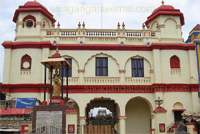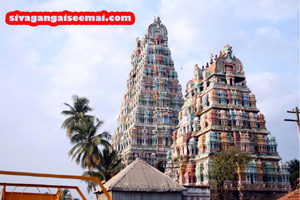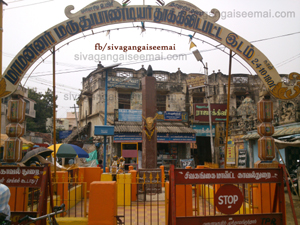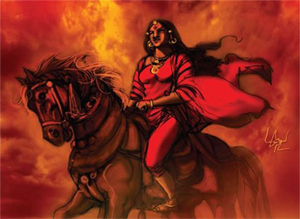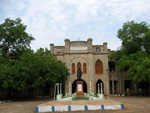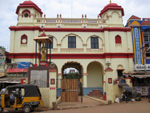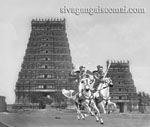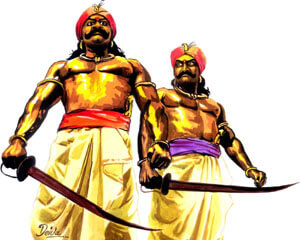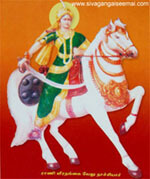AGNEW’S PROCLAMATION
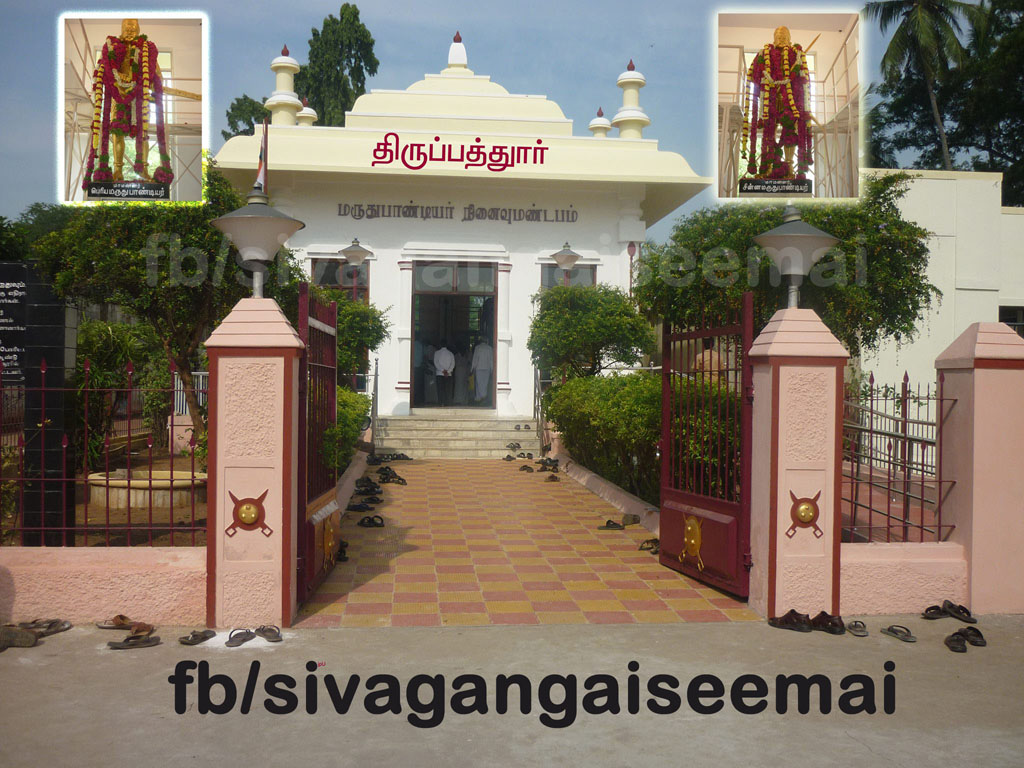
On the 12 th of June 1801, Agnew issued a proclamation, warning the inhabitants of Sivaganga of the dreadful consequences of resistance. Calculated to undermine the popular image of Maruthu Pandyan, to persuade his brother Vella Marudu to betray the rebel cause and to encourage rival claims to the throne of Sivaganga, he announced; “Whereas Chinna Marudoo ( Marudu), the Sherogar of Sivaganga, unmindful of his duty to the Company’s Sirkar and their repeated and positive orders has not only assisted the rebels of Panjalamcourchy ( Panjalamkurichi) with men and ammunition, and given protection to the rebels of Veerapatchy ( Virupakshi) but levied war against the Company by attacking their forts, murdering their servants and subjects and plundering their territories.
It is known to the inhabitants of Sivaganga and to the whole world the complete protection and comfort they have enjoyed ever since they were placed under the Company’s Government and the security and indulgence that has been extended to Chinna Murdoo as the servant of the Heiress notwithstanding his crimes prior to that period. It is also fully known to them that this rebel Chinna Murdoo was sent a few years past a slave in the family of their former Rajah Muthu Wadaganaud Tevar. Having obtained the confidence of the Rany on the death of the Rajah he has long exercised a severe and improper sway in the country, and now that the Heiress ( in what manner she died has not yet been ascertained) he has filled up the measure of his crimes by taking up arms with a view to usurp the rights of the lawful heir of Sivaganga.
The English Sirkar justly incensed at such flagrant conduct has sent Colonel Agnew with an army to punish the rebel Chinna Murdoo and the supporters of his rebellion but with instructions to protect those who adhere to the Company’s Sircar and the interests of the lawful heir of Sivaganga whosoever that may be. The persons who consider themselves entitled thereto are therefore required to repair without delay to Colonel Agnew’s camp where they will receive the fullest protection and they may rely on their claims being impartially investigated and the person who shall appear justly entitled to it shall be placed on the Puttom (throne) as soon as the rebels shall have suffered the punishment due to their crimes. Colonel Agnew considers it his duty to warn all those who may consider they have a claim to the Puttom of Sivaganga that such claims will be forfeited for ever if instead of repairing to his camp they join the Rebel Chinna Murdoo or his party. Colonel Agnew has been given to understand that Vella Murdoo, the brother of the rebel Chinna Murdoo, disapproves his brother’s wicked conduct - Colonel Agnew though determined to punish the guilty, is anxious to save the innocent - humanity - therefore prompts him to offer Vella Murdoo and his family protection if he will repair to his camp from whence he will give his safe conduct to Madura there to remain in quiet. Having thus explained to the inhabitants of Sivaganga the motives of the English Sircar for sending an army into their country he now warns them of the dreadful consequence that must inevitable result from their attempting to oppose the Company’s arms and the interests of the lawful heir to the Puttom by adhering to and fighting for the rebellious Chinna Murdoo, the usurper of his rights.
The awful example before them of the recent fate of the rebels of Panjalamcourchy (Panjalamkurichi) Veerapatchy (Virupakshi) and Dally (Delli) they cannot be ignorant of such will be the dreadful punishment of the inhabitants of Sivaganga if they too oppose the Company’s troops and of all who fight aganist them Intimidation and concentration of military might on Sivaganga did not deter the insurgents from their firm resolve to continue the struggle. Elaborate preparations already carried into effect enabled Marudu Pandyan to co-ordinate the offensive operations. Large quantities of grain and fire- arms had already been deposited in the jungles of Ramamangalamkottai within four miles of Kalayarkoil. More stores had been established at Kalayarkoil, Kadalgudi and Kallarkudi. Even before March 1801 the rebels gathered the firearms, repaired them and completed preparations in their woods for the most obstinate war. Confident of meeting their needs of grain from their stores, they laid waste the entire country in their endeavour to harass the advancing forces and to deprive them of supplies.
In May 1801, the insurgents who retreated to the jungles of Sivaganga from the different provinces, reinforced by more bodies of armed inhabitants, launched a desperate offensive. They stormed the British strongholds and made deep inroads in the territories controlled by the enemy. In the course of the initial wave of attacks the pillaging parties vanquished the forces of the Company and its ally, the Nawab of the Carnatic, in the battles fought at Tirupatore and Nattham. They stormed Tirmvelur and Melur, captured the fire- arms and ammunition deposited therein and got themselves better equipped. In Verapur, Bomma Nayak headed the rebellion and expelled the servants of the Company, who were engaged in the collection of revenue. From here the insurgents advanced towards Madurai. Commanded by Oomathurai, a column of armed men liberated Palaynad. In July the Kallar tribes of Anioornadu defied the Company’s authority and liberated the western region of Madurai. Exuberant at these victories the veterans advanced to Madurai to assault the fort, but finding the British garrison well entrenched, they directed their course to Kadarakoil and took possession of it-
After the occupation of Nattam, the pillaging parties made an attempt to make incursions into the district of Tiruchirapalli but were thwarted by Captain Blair. Subsequently they posted a strong guard at the Convoypatti Pass to safeguard their newly- acquired possessions Raghunatha Tondaiman, Rajah of Pudukkottai reported to Governor Clive; At present Chinna Marudu, confederated himself with Sevatiah is exciting disturbances. Having occupied the forts of Tirmvelur, Melur and Nattam he has plundered the military stores, guns and firelocks of the Company and sent parties to Ramnad. “ The flame of rebellion is warm on every side.”
In Ramnad the patriots scored more victories. The armed columns which arrived from Tirunelveli upon their discomfiture at Panjalamkurichi infested Palameri ( Palamaneri) and administered a severe blow to the British force stationed at this post. They followed up this victory by a siege of the fort of Tiruchuzhi, which surrendered on the 16th of July. After consolidating these gains, the rebels formed themselves into two columns for further assaults: one party headed by Melappan moved to the southern region of Ramnad while the other commanded by Puttur, marched to the northern border. Their co-ordinated operations resulted in the liberation of most of Ramnad from the British rule. The administration of the Company took refuge in the fort of Ramnad. The possession of this territory not only added to the strength of the rebels but gave them control of the entire coast. Afflicted by the famine conditions created by the British embargo on imports, more inhabitants appeared ready to join the struggle. The command of the coastal waters enabled them to obtain uninterrupted supplies of grain and war equipment brought in by the doneys from the port of Tondi. On the 16th of June 1801 the British administration received report of a rebel proclamation. Issued under the name of Marudu Pandyan, a copy of it was found on the wall of the large open gateway leading to the Nawab’s palace in the fort of Tiruchirappalli. It was addressed to the people of South India, mentioned in it as the Peninsula of Jambu Dweepa. Another was found on the wall of the great Temple of Srirangam. It was addressed to all the inhabitants of India, referred in it as the Island of Jambu.
The selection of Tiruchirapplli and Srirangam as the venues of the proclamation was of significance under the prevalent circumstances. These two places, like Coimbatore, lay within the sphere of rebel influence. Tiruchirapalli was a centre of political activity, for it was the control of this strategic fort that enabled the English to turn the tide of their long struggle against Chanda Sahib and the French in their favour and to consolidate their power in the South, Srirangam as a Hindu spiritual centre, appeared as a suitable place for the issue of an appeal to all the people of the entire sub-continent. Addressed by the principal architect of the Peninsular Confederacy, it reflected the ideals of nationalism which moulded and promoted the awakening of the people against the alien regime. Announced in an hour of trial it represented an attempt not only to instil confidence in the people in their great struggle but to gain the co-operation of the entire population.
Unsurpassed by any similar declaration in the annals of India’s freedom struggle, the Tiruchirapalli proclamation constitutes a remarkable document. It enshrines in itself a unique combination of ideals and data, as presented by a great patriot, hailing from the masses. An all-Indian concept inspired the proclamation, for it not only made a direct appeal to the entire country but expressed an anxiety that if the political malady persisted, the entire India would fall under alien rule. A high sense of nationalism guided the entire conception. It exhorted all religious and communal sections, whether they were peasants, sepoys, or civil servants to rally to the patriotic cause. However the details are more of South Indian interest as the rebels had no definite knowledge of the political developments in the North-East, and the English had not established their sway in the North. It indicted Mohammad Ali, Nawab of the Carnatic, for his folly in his dealings with the Company, the inhabitants for their indifference and the English for their duplicity and arrogance. The advocacy of the hereditary rights of the princes and national customs made in the proclamation, would appear ill- conceived in the light of modern concepts of liberalism, but it could not be denied that it seemed a necessity for securing popular support during a period when tradition swayed the imagination of the people. The English version of the two proclamations which are almost identical in their contents proceeds thus.
MARUDU PANDYAN’S JAMBU DWEEPA PROCLAMATION
"Who ever sees this paper, Read it with Attention." “To the castes, nations, Brahmins, Kshetriyas, Vysyas. Sudras and Musselmen that are in the Island of Jamboo in the Peninsula of Jamboo Dweepa this notice is given. “ His Highness the Nawab Mohammad Ali having foolishly given the Europeans place amongst you is become like a widow. The Europeans violating their faith have deceitfully made the kingdom their own and considering the inhabitants as dogs, accordingly exercise authority over them. There existing no unity and friendship amongst you the above castes, who, not being aware of the duplicity of these Europeans- have not only inconsiderately calumniated each other, but have absolutely surrendered the Kingdom to them. In these countries now governed by these low wretches, the inhabitants have become poor and the rice has become vellum ( water). And although they manifestly suffer, they are still without understanding to discern it. It is certain that the Man must die- although he may live a thousand years! And it is as certain that his fame will survive him as long as the Sun and Moon (Shine). Therefore it is devised and determined that in future each shall enjoy his hereditary Rights, namely to His Highness the Nawab Arcot Subah Vijaya Ramanah Tirumala Nayak the Carnatic, Tanjore the first place and to others their respective kingdoms all to be given to their rightful sovereigns without any violation of faith and national customs (The Europeans must) confine themselves to a dependent service on the Nawab from which they may expect to derive a real and uninterrupted happiness. As the authority of the Europeans will be destroyed, we shall enjoy as in the service of the Nawab, constant happiness without tears.
It is therefore recommended that every man in his place and palayam fly to arms and unite together in order to make even the name of the low wretches cease. Then all the poor and the needy will get subsistence. But should there be any who like dogs desirous of an easy life, obey the commands of these low wretches, such should be Karoo or cut off. As all know with what subtility these low wretches, always in unity with each other have subdued the country! Therefore you Brahmins, Kshetriyas Vysyas, Sudras and Musselmen, all who wear whiskers, whether civil or military, serving in the field or elsewhere, and you subedars, jamedars, havildars, nayaks and sepoys in the service of the low wretches and all capable of bearing arms, let them in the first place display their bravery as follows.
“Wherever you find any of the low wretches destroy them and continue to do so until they are extirpated. Whoever serves the low wretches will never enjoy eternal bliss after death, I know this. Consider and deliberate on it. And he who does not subscribe to this may his whiskers be like the hair of my secret parts and his food be tasteless and without nourishment and may his wife and children belong to another and be considered as the offspring of the low wretches to whom he had prostituted her. Therefore all but whose blood is not contaminated by Europeans will begin to unite. Whoever read this or hears of its contents let him make it as public as possible by writing it to his friends, who in like manner must publish it to theirs. Everyone who shall not write it and circulate it as before mentioned, let him be held as guilty of the enormous crime of having killed a black cow on the banks of the Ganga and suffer all the various punishments of hell The Musselmen who do not conform to this, let him be considered as having drunk the blood of a pig. Whoever takes this off the wall where it is pasted let him be held as guilty of the five greatest sins. Let everyone read and take a copy of this address. Thus MARUDU PANDYAN, the servant of the great Rajahs but the implacable Enemy of the European low wretches.
To all living at Srirangam the priests and great people, MARUDU PANDYAN, prostrates himself at their feet. The Sovereigns made and kept ports, mud bastions, churches and chapels, The above great Rajahs and People by the injustice of the low wretches are now reduced to poverty. So great a people as you are reduced to this State! Grant me your Blessing” MARUDUPANDYAN “Jambu Dweepa Proclamation of Mardu Pandiyan was the first document which proclaimed the integration of India and the unity of Religions. The proclamation was the claim call of a subdued race to rise against the tyranny of an external force. The Proclamation of Maruthu Pandiyan of 1801 was a prelude warning to the East India Company that the people of India would unite together immediately and rebel against the Company in future which became a reality by the first great upsurge of the people in 1857 which was termed as the First War of Independence in the History of the Freedom Struggle Movement in India. It is considered the first kind in the Histroy of India. It might appear strange that the rebels at times used unrefined language. But what is to be remembered is that they belonged to the ranks of the common people and that the words they used were in condemnation of the people who remained indifferent to the cause of Rebellion or turned traitors.
The five greatest sins are; the killing of a Brahmin, adultery with the wife of the master, drinking of liquor, theft of gold and finally connivance at doing any of these offences. While expiation can be had during the present life for ordinary sins, it cannot be had for the five greatest sins, for their effect will continue even after rebirth, according to Hindu belief. By brilliant daring and enterprise, the rebels expelled the enemy from extensive regions of Ramnad, Madurai, Kallarnadu and Thanjavur They organised their administration in the liberated territories, sought to consolidate their gains and to translate into practice their political ideals. Before long, however, they faced overwhelming opposition from the enemy. Determined to regain the initiative, the English rushed in powerful detachments from other provinces and pressed into action more troops of its allies. In the desperate struggle that followed ill-equipped crowds faced well armed forces. The patriots found the odds so unsurmountable that they could no longer sustain the forces of the liberty” “Agnew, who assumed the command of the operations against the extensive insurrection, formulated a forward strategy aimed at the defence of Madurai against the threat of rebel assault, retention of the control of key posts and an offensive in three directions- one from the south - east from Tirunelveli another from the north - west from Dindigul and the third from the north - east from Thanjavur to the rebel held territories. After the attainment of these objectives he decided on a thrust against the insurgent concentrations in the jungles of Kalayarkoil.
With the attainment of these immediate aims, Agnew embarked upon a difficult campaign through Ramnad. He occupied Palamaneri, from where he directed his course to the north. Experiencing considerable resistance, the detachment reached Tiruppuvanam situated east of Madurai. This successful march through the rebel controlled territory greatly relieved the rebel pressure on the city of Madurai. Agnew sent a body of troops led by Major James Graham, to reinforce the garrison at Madurai, but the patriots in great force fell upon the advancing party. A relief expedition, commanded by Major Sheppard, moved to the rescue of Graham, upon which the attacking parties withdrew to the jungles.
From Tiruppuvanam the British army turned to the south- east, contemplating upon a move to Ramnad. The odds involved in this operation were great, for the nature of the country appeared quite unfavourable and concentration of rebel power seemed considerable. On the 7th of June, Agnew moved to Tiruppachetty, from where he advanced to Manamadurai marching along the bank of river, Palamaneri, the enemy occupied Paramagudi on the 11th. The insurgents hovered around the British army throughout its march from Tiruppuvanam to Paramagudi. The terrain being favourable, they effectively utilised the advantage for harassing the enemy. On the 7th of June at Tiruppachetty, the rebels posted individually and in small parties kept up a distant but galling fire on a body of troops that was detached to cover the flank of the line. The scattered disposition of the rebel parties together with the nature of the ground prevented the Company’s troops from returning the fire successfully.
Tormented greatly, Agnew sent regular infantry against the armed column, but the latter retreated with such rapidity as to defy pursuit. Deriving confidence in their tactics and benefited by the favourable nature of the country, the armed crowds again pressed vigorously on the rear- guard of the detachment. On reaching a convenient spot the cavalry, supported by a party of infantry and a field piece, moved against the insurgents But the rebels by a daring counter attack separated a body of troops from the principal detachment which could not regain the broken ground that it had originally occupied, and cut it to pieces. They followed up this success by disputing the ground that was found requisite for occupation by the piquets and in a series of engagements inflicted more losses upon the enemy.
On the succeeding day the extreme closeness of the jungles gave them more opportunities but they preserved a respectable distance, firing only a few random shots. After reaching Manamadurai, the detachment resumed its tedious march on the 10 th. Now strong parties of rebels. equipped with fire- arms lined themselves behind high banks, water courses and jungles on the opposite bank of river Palamaneri. Major Sheppard led a body of troops against the attacking crowds while the flanking parties reached the opposite bank of the river. However the rebels appeared so unusually numerous that the detachment was compelled to withdraw. The retreat was effected in good order but the rear- guard, returning too soon and neglecting to occupy a strategic position in a village neraby, was closely engaged. The enemy lost many of its troops, they were shot or piked to death. Emboldened, the rebels made a gallant dash across the river and vigorously attacked the forces with pikes. In a grim contest that ensued both the sides suffered heavy casualty. Constantly harassed, the detachments of Agnew by forced marches reached the village of Gangaikondan on the 12 th of June. Two days later the enemy reached to the protection of the heavy batteries on the ramparts of Ramnad.
On the 22nd June Agnew encamped at Kumudi, a strong and compact stone fort, and strengthened its garrison. Advancing through Palamaneri the expedition reached Madurai on the 9 th of July. The rebels, engaged in conflicts with the detachment of Innes marching from Dindigul in the meantime, found it beyond their means to attempt to check the progress of this expedition from Ramnad. Agnew spent the succeeding weeks at Madurai, dispersing the rebel concentrations and consolidating his position. Subsequently, he led his army to Tirupatore and took it by storm on the 24 th of July. Here he waited for making a junction with the forces of Innes before beginning the more arduous campaign in the jungles of Kalayarkoil” .
The patriots strove hard to check the British expedition from the north west to Madurai Reaching Nattam on the 13 th of June, Innes received reinforcement from Pudukkottai “On the 4 th July the forces moved towards Manapacheri situated eight miles away from Piranmalai. Innes decided to attack Piranmalai, a stone fort of considerable extent and elevation. embracing the declivity of a rocky projection and well manned by the rebels” 114 but Agnew cautioned him against any rash adventure, as the probability of success. In his judgment did not strongly overbalance the risk of defeat. The assailants reconnoitered the rebel stronghold but judging their strength quite inadequate, did not take a chance. On the 6 th the insurgents began a heavy fire on the British positions. Two days later the columns led by Vella Marudu and Chinna Marudu, attacked the British forces, pressed vigorously on their lines and drove them off.
The Board communicated to the Collector the order of Government directing the appointment as Zemindar of one Permattoor Woria Tevar collaterally descended from the progenitor of Shesavarana Tevar, the first Zemindar appointed by the Nawab Sadatulla Khan, declaring Vengam Peria Woria Tevar, also a collateral descendant to have forfeited his claim to the Zamindari for having joined Vella Murdu and Chinna Murdu, the usurpers of Sivaganga in their rebellious campaign against Government. A proclamation announcing the appointment and calling upon the people of Sivaganga to obey the Government order is enclosed.
Sivaganga Tourist Places
By fb/Sivagangaiseemai Team / August 28, 2014Kalayarkoil Temple Photos
By Muthukumaran / September 1, 2014Quick Links
Maruthu Pandiyar History in Tamil
Read Maruthupandiyar History in Tamil...
Velu Nachiyar History in Tamil
Velu Nachiyar History in Tamil...
Sivagangai Palace
Sivagangai Palace photo gallery to view Read More ......
Sivagangai Car Festival
Sivaganga Photo Gallery
2008 - www.sivagangaiseemai.com
ALL Rights Reserved. Privacy Policy

